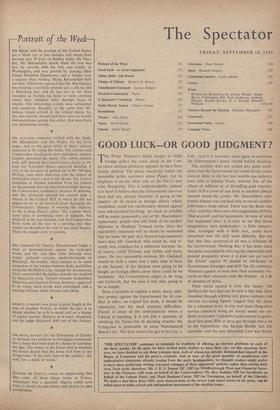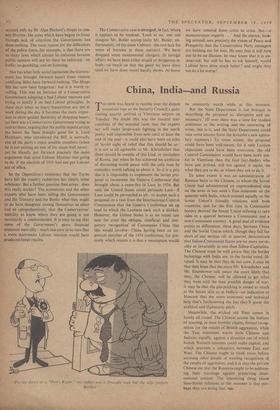GOOD LUCK OR GOOD JUDGMENT?
THE Prime Minister's initial design, to make foreign policy the main plank in the Con- servative election platform, appears to have -been hastily shelved. The party manifesto makes the inevitable polite murmurs about Peace, but its emphasis is on the other side of the Tory's new coin, Prosperity. This is understandable; indeed, it is hard to believe that the Government can ever have had any serious intention of going to the country on its record in foreign affairs, which candidates could not comfortably defend against even sub-standard heckling. As much as possible. will be made, presumably, out of Mr. Macmillan's appearance; people who still think of the perfect diplomat in Madame Tussaud terms (they are regrettably common) will no doubt be reminded that he looks the part of a Summit representative more than Mr. Gaitskell, who could be, and re- cently was, mistaken for a substitute barman. So, of course, could Truman, and Attlee, and many more. On any reasonable estimate Mr. Gaitskell would be both a saner and a safer man to have at the Summit. If the election were going to be fought on foreign affairs alone there could be no hesitation : the Conservatives ought to be rung out forthwith. But the issue is not, alas, going to be so simple.
Were it possible to register a short, sharp, salu- tary protest against the Government for its con- duct in office, we argued last week, it should be registered; but the deed presents difficulties. Except in some of the constituencies where a Liberal is standing, it is not just a question of rebuking the Tories but of deciding whether the frying-pan is preferable to some Nationalised Board's fire. The final choice has got to be Con. v. Lab.:. and it is necessary once again to scrutinise the Government's home record before deciding.
The scrutiny does not arouse any great confi- dence that the Government has events firmly under control. Only in the last few months has industry been able to breathe freely, without fear of the effects of inflation or of dwindling gold reserves. Until 1959 a crisis of one kind or another always seemed round the corner. Mr. Macmillan's cele- brated plateau was reached only to reveal another inflationary slope ahead. There was the Bank rate crisis; and then there were the resignations of Peter Thorneycroft and his lieutenants. In view of what has happened since it is easy to see that those resignations were unnecessary : a little compro- .
mise, arranged with a little tact, could have smoothed over the little local difficulty. But the fact that they occurred at all was a criticism of the Government. Nothing that it has done since has quite succeeded in carrying the conviction that present prosperity (even if it does not yet merit the Tories' capital P) should be attributed to Government foresight and skill. On the contrary, Ministers appear to have won their economic vic- tories as their ancestors won the Empire; in a fit of absence of mind.
Their social record is even less happy. "On Defence the best that can be said is that they have muddled through without any grave mishaps; but current recruiting figures suggest that the plans for a volunteer army in any real sense (long-term service contracts being an unreal sense) are un- likely to succeed. Legislative achievement is sparse. Such few good Bills as have got through owe a lot to the Opposition—the Mental Health Act, for example; and the new Obscenity Law was finally secured only by Sir Alan Herbert's threat to con- test Harrow. On sores which have begun to fester through lack of attention the Government has done nothing. The main reason for the difficulties of the police force, for example, is that there are so many laws which cannot be enforced because public opinion will not let them be enforced: on traffic; on gambling; and on licensing.
Nor has what little social legislation the Govern- ment has brought forward (apart from routine codifying Bills) been forward-looking. The Shops Bill has now been forgotten: but it is worth re- calling. This was an instance of a Conservative Government adopting a bad Labour measure and trying to justify it on bad Labour principles. In these days when so many housewives are out at work during the day it becomes the more impor- tant to allow greater flexibility of shopping hours; yet here was a Conservative Government trying to restrict them, arguing that the public should accept the hours the State thought good for it. Lord Hailsham, who introduced the Bill, is normally one of the party's more sensible members (when he is not putting on one of his music-hall turns): yet he blandly put forward precisely the same arguments that some Labour Minister was going to do, if the election of 1951 had not put Labour out of office.
So the Opposition's insistence that the Tories have left the country rudderless has clearly some substance. But a further question then arises : does this really matter? The economists and the other experts who have been telling the Government and the Treasury and the Banks what they ought to do have disagreed among themselves so often and so comprehensively that the Conservatives' inability to know where they are going is not necessarily a condemnation. It is easy to see that some of the Government's panic financial measures were silly : much less easy to be sure that a more doctrinaire Labour reaction would have produced better results. The Conservative case is strongest, in fact, where it appears to be weakest. 'Look at us,' one can imagine Mr. Butler saying (only Mr. Butler, un- fortunately, of the inner Cabinet : the rest lack his sense of humour in these matters). 'We have dropped some monumental clangers. In foreign affairs we have been either stupid or dangerous or both—so much so that the good we have done (and we have done some) hardly shows. At home
we have tottered from crisis to crisis. But—si monumentum requiris . . .' And the elector, look- ing around, sees precisely the vision of Peace and Prosperity that the Conservative Party managers are holding out for him. He may fear it will turn out to be an illusion; he may know that it is un- deserved; but still he has to ask himself, would Labour have done much better? and might they not do a lot worse?











































 Previous page
Previous page